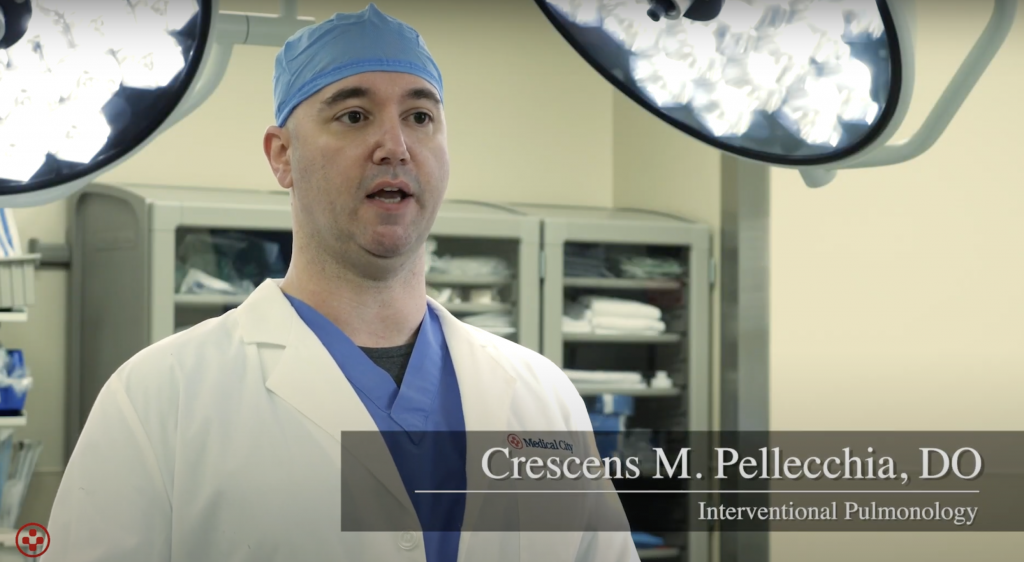Medical City Plano’s Comprehensive Lung Program provides the opportunity to screen for and diagnose early-stage lung cancer. Who qualifies for a lung screening through the Medical City Plano Comprehensive Lung Program?
Sarah Cannon, the Cancer Institute of HCA Healthcare, recommends screenings every year for people who meet the following criteria:
Adults ages 50-80*
Those who have at least a 20 pack-year smoking history and are current smokers or have quit within the past 15 years
Patients with no current signs or symptoms of lung cancer who have been referred by their primary care physician
- Must be 50-77 for Medicare
What happens after a lung cancer diagnosis?
If you’re diagnosed with lung cancer, you’ll be referred to a thoracic surgeon who will guide you in your treatment, which may include:
Staging the cancer to see how far it might have spread
Determining whether you are a good surgical candidate and if so, removing as much of the cancerous tissue as possible.
Restoring physical function and appearance affected by cancer or cancer treatment
Relieving side effects or symptoms of cancer or treatment, including pain
“The Center for Lung Health at Sarah Cannon Cancer Hospital at Medical City Plano is a great, unique clinic that incorporates the input from both interventional pulmonologists and thoracic surgeons to identify the best care for each patient,” Dr. Lee says. “Lung cancer therapy and treatment has advanced immensely in the past 10 to 15 years, to minimally invasive techniques that allow the patient to go home in two to three days.”
“There’s also radiation and new immunotherapy and cancer treatments that allow the patients to try to live with the cancer like it’s diabetes or high blood pressure. Lung cancer is a deadly cancer, and if we do treat it early, patients get the best effects of our treatments that we can offer.”
Not including skin cancer, lung cancer is the next most common type of cancer in both men and women—second only to breast cancer in womenand prostate cancer in men. Talk to your doctor about whether lung cancer screening is right for you.
New technologies for treating lung cancer
There’s good news on the horizon when it comes to treating lung cancer.
“We have new technologies available that help us diagnose and stage lung cancer,” says Crescens Pellecchia, MD, an interventional pulmonologist at Medical City Plano. “We’re able to diagnose patients earlier, which improves outcomes and allows people to live longer. Once you have a diagnosis of lung cancer, your doctor may order other tests to help stage and work up where the cancer is and if it has spread.”
Some of those tests may include:
Pulmonary function tests (breathing tests) to determine lung strength
Imaging tests, such as:
Computed tomography (CT) scans, which produce images that show the size and location of tumors
Magnetic resonance imaging (MRI), which produces similar images but is more helpful in showing if lung cancer has spread
Positron emission tomography (PET) scans, which use a sugar substance that lights up cancer in the body
“For patients that are found to have a spot, or nodule, on the lung, we have some new technology that allows us to diagnose and stage their lung cancer earlier, which allows them to have a higher chance of a cure,” Dr. Pellecchia says.
“One of these important technologies is a robotic camera that we can control, that can go into the lungs, all the way out to these small spots, and with a high degree of accuracy and a low complication rate, be able to diagnose these little cancers earlier and get that diagnosis in real time, which will allow a surgeon to remove that cancer in the same setting. This allows a patient to have a diagnosis and a cure within the same day.”
Not every test or procedure is appropriate for every person, so talk with your doctor about which treatments are right for you.

